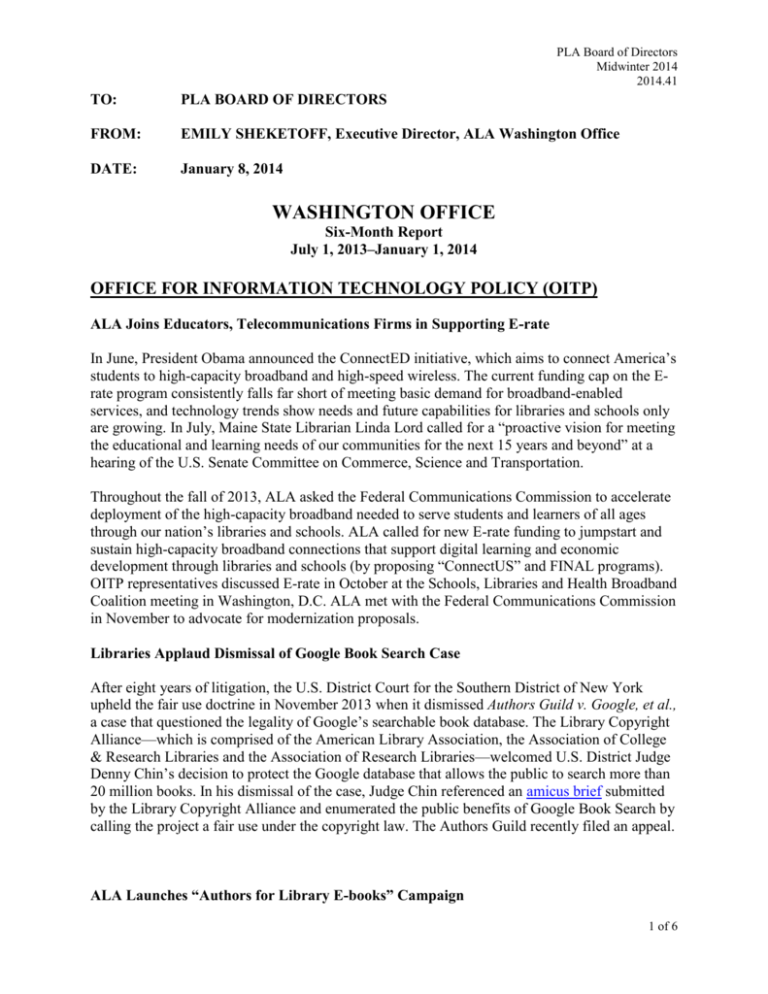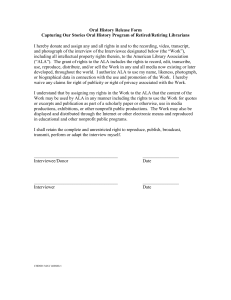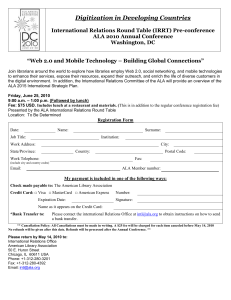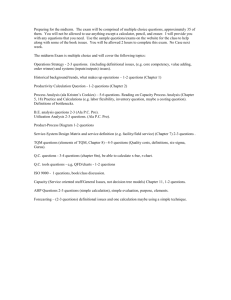2014.41 ALA Washington Office Report
advertisement

PLA Board of Directors Midwinter 2014 2014.41 TO: PLA BOARD OF DIRECTORS FROM: EMILY SHEKETOFF, Executive Director, ALA Washington Office DATE: January 8, 2014 WASHINGTON OFFICE Six-Month Report July 1, 2013–January 1, 2014 OFFICE FOR INFORMATION TECHNOLOGY POLICY (OITP) ALA Joins Educators, Telecommunications Firms in Supporting E-rate In June, President Obama announced the ConnectED initiative, which aims to connect America’s students to high-capacity broadband and high-speed wireless. The current funding cap on the Erate program consistently falls far short of meeting basic demand for broadband-enabled services, and technology trends show needs and future capabilities for libraries and schools only are growing. In July, Maine State Librarian Linda Lord called for a “proactive vision for meeting the educational and learning needs of our communities for the next 15 years and beyond” at a hearing of the U.S. Senate Committee on Commerce, Science and Transportation. Throughout the fall of 2013, ALA asked the Federal Communications Commission to accelerate deployment of the high-capacity broadband needed to serve students and learners of all ages through our nation’s libraries and schools. ALA called for new E-rate funding to jumpstart and sustain high-capacity broadband connections that support digital learning and economic development through libraries and schools (by proposing “ConnectUS” and FINAL programs). OITP representatives discussed E-rate in October at the Schools, Libraries and Health Broadband Coalition meeting in Washington, D.C. ALA met with the Federal Communications Commission in November to advocate for modernization proposals. Libraries Applaud Dismissal of Google Book Search Case After eight years of litigation, the U.S. District Court for the Southern District of New York upheld the fair use doctrine in November 2013 when it dismissed Authors Guild v. Google, et al., a case that questioned the legality of Google’s searchable book database. The Library Copyright Alliance—which is comprised of the American Library Association, the Association of College & Research Libraries and the Association of Research Libraries—welcomed U.S. District Judge Denny Chin’s decision to protect the Google database that allows the public to search more than 20 million books. In his dismissal of the case, Judge Chin referenced an amicus brief submitted by the Library Copyright Alliance and enumerated the public benefits of Google Book Search by calling the project a fair use under the copyright law. The Authors Guild recently filed an appeal. ALA Launches “Authors for Library E-books” Campaign 1 of 6 PLA Board of Directors Midwinter 2014 2014.41 During the 2013 Annual ALA Conference, Maureen Sullivan, ALA immediate past president, announced the launch of “Authors for Library Ebooks,” a new initiative that asks authors to stand with libraries in their quest for equitable access to e-books. Bestselling authors Cory Doctorow, Ursula K. Le Guin and Jodi Picoult helped kick off the campaign. The campaign represents an extension of ALA’s advocacy strategy to ensure all people have access to the world’s knowledge and literature through our nation’s libraries—regardless of format. Developed by the ALA’s Digital Content & Libraries Working Group, the campaign encourages authors to sign on to a statement of shared values, to discuss the issue with their publishers, and raise awareness of their concerns through their websites, social media and other communications channels. ALA Launches Policy Revolution! Initiative for Libraries The Office for Information Technology Policy will begin work on a national public policy agenda and action plan for U.S. libraries with support from a new grant from the Bill & Melinda Gates Foundation. Nearly $1 million in funding over three years will enable ALA to increase library visibility and bolster capacity for sustained action on the national level. The initiative will evaluate ALA advocacy efforts and enhance the organization’s policy messaging and communications. Pew Report: Libraries Key to American Dream An overwhelming majority of Americans acknowledge that public libraries offer more than just books and provide community-tailored programs that improve the quality of life, according to “How Americans value public libraries in their communities,” a report released from the Pew Research Center in December. The report found that 95 percent of Americans agree that libraries play an important role in giving everyone a chance to succeed. The Pew Research Center study found that 72 percent of all Americans adults have either used a public library in the past year or live in a household with a family member who is an active library user. Read the ALA statement: http://www.ala.org/news/press-releases/2013/12/pew-study-libraries-and-society-illustratesexpanding-roles-us-libraries. Visit http://www.pewInternet.org/topics/Libraries.aspx to learn more about the Pew study. OITP represents ALA on the advisory committee for the Pew studies on libraries. ALA Leadership Talks Ebooks with Publishers in New York In late September, ALA President Barbara Stripling led an ALA delegation to New York to meet with publishers and others in the publishing ecosystem; the delegation included Immediate Past President Maureen Sullivan, Keith Michael Fiels, DCWG Co-chair Robert Wolven and Alan S. Inouye. ALA delegation members met with executives at Penguin Random House and Simon & Schuster, the Association of American Publishers and the American Booksellers Association. Alan Inouye wrote about the leadership meetings on the American Libraries’ E-content blog. Google, ALA Host Webinar: Revisiting CIPA 10 Years Later 2 of 6 PLA Board of Directors Midwinter 2014 2014.41 In July, the American Library Association and Google, Inc., hosted a national symposium where library, education, technology, legal and policy experts considered the impact of the Children’s Internet Protection Act on access to electronic information. Participants joined a wide range of experts to discuss insights looking at legal, ethical, and political implications of how the CIPA requirements have been implemented in the past 10 years. “Revisiting the Children’s Internet Protection Act: 10 Years Later” was part of the Office for Information Technology Policy and Office for Intellectual Freedom’s larger project on CIPA and access to information, made possible through support of Google, Inc. A white paper will be released at the 2014 ALA Midwinter Meeting in Philadelphia. ALA Submits Comments, Testifies on Department of Commerce Green Paper on Copyright In November, ALA, with the Library Copyright Alliance (LCA), submitted comments in response to the Department of Commerce’s green paper, Copyright Policy, Creativity, and Innovation in the Digital Economy. The Internet Policy Task Force of the Commerce Department issued its report in July 2013 and proposed recommendations in three areas: updating the balance of rights and exceptions; assessing and improving enforcement tools to combat online infringement; and realizing the value of the Internet in commerce via online licensing. Any changes in the law in these three areas will impact libraries if exclusive rights are expanded in the digital environment, if online service providers (like libraries who provide public access to computers) are held liable for the infringements of others. The LCA commented on statutory damages in the context of individual file sharers and secondary liability and on online licensing, specifically: the impact of online licensing platforms on fair use; collective rights organizations operating such a platform, and possible negative consequences of the proliferation of licensing as contracts place restrictions on copyright exceptions. At a public meeting held in December, LCA sat on a Department Commerce panel on online transactions. LCA is concerned about mandatory licensing regimes that make the assumption that all uses can be licensed will restrict fair use. In addition, existing licensing mechanisms and clearinghouses have a history of fraud. LCA will follow up with reply comments on the public meeting in January 2014. Additional public roundtables are tentatively scheduled in the spring 2014. Jamie Schleser Selected for 2013 ALA Google Policy Fellowship Jamie Aurelia Schleser, a doctoral student from American University, served as the American Library Association’s 2013 Google Policy Fellow. During the summer of 2013, Schleser worked with OITP in Washington, D.C. on technology and Internet policy issues. As a Google Policy Fellow, Schleser worked in diverse areas of information policy that include digital copyright, ebook licenses and access, telecommunications policy, digital literacy, online privacy, and the future of libraries. Her dissertation examines how networked memory institutions—including the Internet Archive, the World Digital Library and the Digital Public Library of America—are using the Internet to inform cultural production and communication in broad strokes. 3 of 6 PLA Board of Directors Midwinter 2014 2014.41 Digital Content Working Group Hosts Ebook Town Hall Nearly 700 librarians, publishers and media reporters participated in the American Library Association’s first “Virtual Town Hall” on Ebooks in October. As part of the virtual town hall, several key ALA leaders discussed efforts made to advocate for library interests in the publishing world. Participants had the opportunity to join ALA President Barbara Stripling, Immediate Past President Maureen Sullivan and the leadership of the ALA’s Digital Content Working Group to discuss ALA ebook activities, plans and future directions. Panelists also provided views on the current digital publishing climate and discuss ways that ALA can better advocate for important library interests. View the archived town hall. OFFICE OF GOVERNEMNT RELATIONS (OGR) ALA calls for accountability and transparency in nation’s surveillance laws ALA was gravely concerned, but unfortunately not surprised, at the June 2013 Edward Snowden revelation that the U.S. government obtained the data on millions of innocent and unsuspecting Americans (as well as several world leaders). ALA called upon Congress to provide more accountability and transparency about how the government is obtaining and using vast amounts of information about innocent people. In July, the American Library Association joined an unprecedented coalition of Internet companies and advocates to deliver a letter to the U.S. government demanding greater transparency around national security-related surveillance of Internet and telephone communications. Key civil liberties organizations and major companies such as Apple, Facebook and Twitter, joined in the effort with dozens of other companies and organizations, both large and small. WeNeedToKnow, the newly launched petition directed at the White House invites the public to contribute to the call for greater transparency around government surveillance. In response to the NSA leak, ALA launched “ALA Liberty,” a website that contains tools libraries can use to host educational sessions and public forums that help Americans understand their First and Fourth Amendment rights. The website contains guides and tip sheets for libraries interested in informing members of the public about their civil liberties. The tools provide an overview of the deliberative process and outlines ways that the public can demand government oversight and transparency from legislators. Reforms to the National Security Agency's massive unconstitutional surveillance program may soon be underway. In the same week in December, the surveillance reform debate was enjoined in all branches of government. Executive Branch: In December, President Obama's Review Group on Intelligence and Communications Technologies released a report calling for transparency, online security tools, and organizational reforms to the NSA. Legislative Branch: The American Library Association joined more than 50 businesses, civil liberties groups and public interest organizations in opposing the FISA Improvements Act, a bill that will legalize and extend NSA mass surveillance programs. Opposers to the bill include the American Civil Liberties Union, the Electronic Frontier 4 of 6 PLA Board of Directors Midwinter 2014 2014.41 Foundation, PEN American Center, TechFreedom, and others. Judicial Branch: D.C. District Court Judge Richard Leon ruled that the National Security Agency's surveillance practices on millions of unsuspecting Americans may be unconstitutional. In the ruling, D.C. District Court Judge Leon found the surveillance practices to be an "indiscriminate" and "arbitrary invasion" of personal data on Americans. In addition to finding that the program violates First and Fourth Amendments guaranteed by the Constitution, Judge Leon also examined the ineffectiveness of the NSA program in preventing terrorism. One week later, a district court in New York found just the opposite, ruling that the bulk collection of telephone data does not violate the Constitution. Judge William Pauley of the Southern District of New found that privacy protections protected in the Fourth Amendment should be balanced against a government need to prevent future terrorist attacks. “The right to be free from searches is fundamental but not absolute,” said Judge Pauley. “Whether the fourth amendment protects bulk telephony metadata is ultimately a question of reasonableness.” ALA expects that the surveillance issue will be taken to the U.S. Supreme Court. ALA Welcomes USA Freedom Act ALA is rallying librarians to support the USA Freedom Act, a bill that will improve the balance between terrorism prevention and personal privacy protection. The USA FREEDOM Act would place restrictions on bulk phone and internet government surveillance, and permit companies to make public the number of FISA orders and National Security Letters received. The bicameral legislation would rewrite section 215 of the Patriot Act. ALA is encouraging members, library supporters and privacy advocates to tell their U.S. representatives and senators to cosponsor the Freedom Act. Library Services Impacted by Government Shutdown In October, the U.S. government shut down after Congress failed to compromise on a continuing resolution to fund the government. While the ALA Washington Office remained up and running, the shutdown had a noticeable impact on library services across the country. The Institute of Museum and Library Services closed and was unable to disperse grants and funds to libraries as part of the Library Services and Technology Act. The Government Printing Office was shut down, and the U.S. Census websites and collection surveys were unavailable until the government reopened. The Library of Congress was also closed to the public and researchers for the duration of the shutdown. IMLS, ALA Detail Affordable Care Act Resources for Library Staff The Institute of Museum and Library Services (IMLS) and ALA announced information resources for libraries to use to assist patrons about the Affordable Care Act in July. OCLC’s library program WebJunction will provide online educational webinars, tip sheets, and other resources to help library staff members respond to increased patron information needs related to the new health insurance marketplace. Library staff can access materials, online resources, webinar registrations, and archived webinar recordings at the WebJuction website. 5 of 6 PLA Board of Directors Midwinter 2014 2014.41 OGR Involved with New Project on Seniors and Technology In the fall, the Office of Government Relations co-sponsored and participated in a pilot workshop with Senior Service America, Inc., Montgomery County Public Libraries, the Benton Foundation, as well as officials from both the U.S. Department of Labor and the Maryland Workforce Corporation. Participation in the workshop is part of ALA’s efforts to ensure that libraries are recognized and can get funding for workforce investment programs. The pilot workshop is intended to be replicated in a number of other states and support senior job hunters by offering digital literacy training through libraries and cooperative activities with various state and local government employment services. ALA Opposes Harmful Federal Research Legislation In November, legislators circulated language for the Frontiers in Innovation, Research, Science and Technology Act of 2013, a bill that would restrict public access to articles reporting on federally-funded research for up to three years after initial publication. The proposed delay is two and a half years longer than what is proposed in the bicameral and bipartisan Fair Access to Science and Technology Research Act. ALA has joined in a letter with 10 other national and regional library, publishing, and advocacy organizations expressing our strong opposition the current language in the FIRST bill. National Freedom of Information Day Set for March 2014 The 16th annual National Freedom of Information Day conference will be held Friday, March 14, 2014, at the Knight Conference Center at the Newseum in Washington, D.C. The Newseum Institute’s annual conference brings together librarians, nonprofits, government officials, lawyers, journalists and educators to discuss freedom of information and open records. Last year, the American Library Association posthumously awarded activist Aaron Swartz the Madison Award for his dedication to promoting and protecting public access to research and government information. OGR Hosts Free Webinar on Local Library Advocacy In November, the Office of Government Relations hosted “The Fiscal Situation in Washington and How it Gives Librarians a Huge Advantage,” a webinar that taught library advocates how to influence state and local politics. The webinar was led by OGR advocacy consultant Stephanie Vance, who outlined the current political climate in Washington D.C. and detailed ways that advocates can use inactivity on the federal level to their advantage at the local level. Stephanie Vance also presented findings from a recent OGR advocacy survey that generated over 1,000 responses. The information gathered in the survey will help ALA Washington Office staff and library advocates continue to develop successful grassroots strategies. 6 of 6





